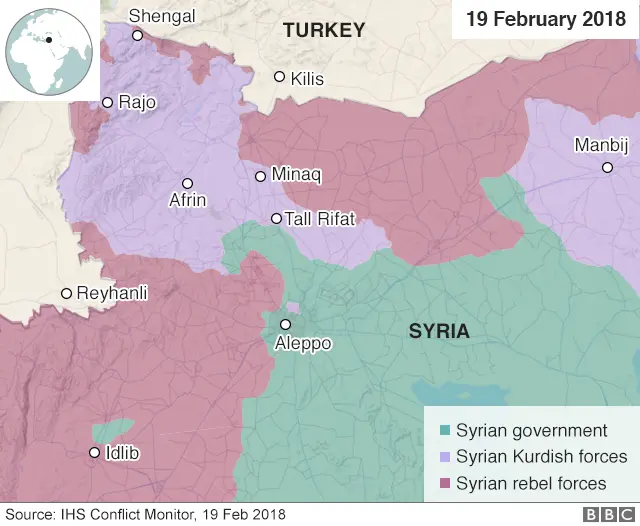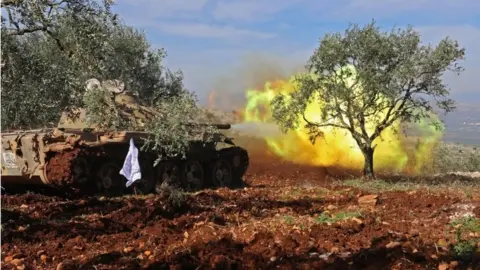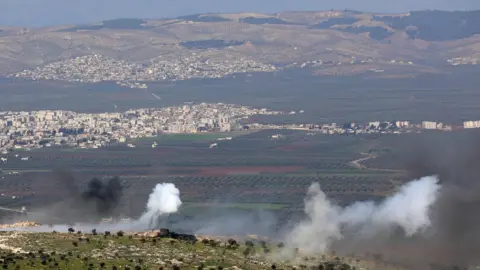Syria war: Pro-government forces enter Kurdish-held Afrin
Syrian pro-government forces have entered the Kurdish enclave of Afrin, provoking an immediate response from Turkish forces besieging the area.
The government was asked for military help by a Kurdish militia that has been trying to repel an offensive by Turkish troops and allied Syrian rebels.
Fighters were seen passing through a checkpoint in armoured vehicles.
Turkish troops then shelled the area and Turkey said it had forced the pro-government fighters to retreat.
Turkey had threatened to confront government forces if they intervened, raising the prospect of direct conflict between two of the main players in Syria's civil war.
The development comes as:
- Syrian government warplanes continued to bombard the besieged rebel-held Eastern Ghouta region outside Damascus, reportedly killing dozens of civilians a day after strikes left more than 120 dead
- The government's ally Russia acknowledged that dozens of its citizens were killed or wounded in a recent armed clash in Syria - an apparent reference to a confrontation this month with US-backed forces in Deir al-Zour
Why is Turkey attacking Afrin?
Turkish leaders say they want to clear the Kurdish enclave of members of the People's Protection Units (YPG) militia, which they consider a terrorist group.
They say it is an extension of the banned Kurdistan Workers' Party (PKK), which has fought for Kurdish autonomy in south-eastern Turkey for three decades.

The Syrian Kurds deny any direct organisational links to the PKK - an assertion backed by the US, which has provided the militia and allied Arab fighters with weapons and air support to help them battle the jihadist group Islamic State (IS).
The Turkish air and ground assault on Afrin, dubbed "Operation Olive Branch", began on 20 January.
Since then, Turkish troops and Syrian rebels have taken about 45 villages, according to the Syrian Observatory for Human Rights.
The UK-based monitoring group says the fighting has left at least 205 Syrian rebels and 219 Kurdish militiamen dead, along with 112 civilians. Turkey says 32 of its soldiers have been killed and denied reports of any civilian casualties in Afrin.
Why is the Syrian government intervening?
The government has denounced the Turkish offensive as a "blatant attack" on its sovereignty.
Soon after it began, the Kurdish authorities in Afrin called on the government to "carry out its sovereign obligations" and send troops to help defend the border from Turkish attacks.
The government, which has so far avoided conflict with Kurdish forces since the start of the civil war in 2011, did not immediately respond to the appeal for help.
 AFP
AFPBut on Tuesday state media reported that members of the "Popular Forces" had arrived in Afrin to "support the locals against the aggression waged by the Turkish regime" and to confront IS, which has no known presence in the area.
A military media unit run by Lebanon's Hezbollah movement - an ally of the Syrian government - posted photos and video of men brandishing Syrian flags passing through a checkpoint on a number of pick-up trucks and lorries mounted with heavy weapons.
A reporter for the official Sana news agency said Turkish artillery had targeted the convoy after it crossed into the Kurdish enclave, as well as media personnel accompanying it.
 AFP
AFPTurkey's state-run Anadolu news agency later reported that Turkish troops had fired "warning shots" at "pro-regime terrorist groups trying to advance" towards Afrin, forcing them to retreat about 10km (6 miles).
Turkish President Recep Tayyip Erdogan said the convoy was made up of Shia militiamen acting independently, adding that he had earlier persuaded the Syrian government's main allies, Russia and Iran, to stop any troops being deployed.
"Unfortunately, these kinds of terror organisations take wrong steps with the decisions they take. It is not possible for us to allow this. They will pay a heavy price," the Reuters news agency quoted him as telling an news conference.
Does this risk a wider escalation?
By Selin Girit, BBC News, Istanbul
For Turks this was not surprising, but it is alarming.
Turkey had said that if Syrian forces came in to Afrin to support the Kurdish YPG forces, there would be serious consequences.
The confrontation risks an escalation in Turkey's one-month old offensive that is aimed at driving the YPG out of Afrin.
There has not yet been an official statement regarding the latest events. But presidential spokesman Ibrahim Kalin had tweeted to say that reports suggesting that Syrian government had struck a deal with the YPG were not based on facts, adding that "dirty and secret negotiations were being held".
Ankara says it is determined to carry on its operation whatever happens. But many argue Turkey would need Russia's backing in order to avoid confronting Syrian troops along with the YPG.
What else is going on in Syria?
Afrin is just one of many active fronts in the country's civil war, which began as a popular uprising against President Bashar al-Assad in 2011.
Government forces, supported by Russian air strikes and Iran-backed militias, are also carrying out offensives on two major rebel strongholds - the north-western province of Idlib and the besieged Eastern Ghouta region.
The UN says more than 300,000 people have been displaced by the fighting in Idlib since December, while almost 200 civilians are reported to have been killed in government air and artillery strikes on the Eastern Ghouta since Monday.
Meanwhile, Russia's foreign ministry acknowledged that dozens of its citizens and people from other former Soviet states were killed or wounded in a recent battle.
It gave no details, but it is believed to be a reference to an incident in the eastern province of Deir al-Zour on 7 February, when the US military said it had killed an estimated 100 pro-Syrian government fighters in response to an attack on an allied, Kurdish-led militia force battling Islamic State militants in the area.
